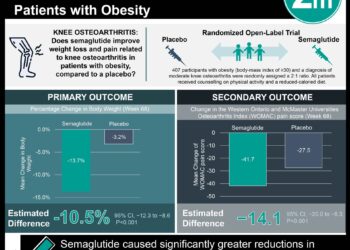Bariatric surgery associated with sustained improvements in mobility and joint pain
1. Bariatric surgery was associated with clinically significant improvements in bodily pain, physical function, joint pain, and joint function at 1 year post-surgery.
2. Although bodily pain and physical function declined between post-surgery year 1 and 3, the rates remained improved when compared to each patient’s baseline function prior to surgery.
Evidence Rating Level: 2 (Good)
Study Rundown: Bariatric surgery is effective in achieving and maintaining weight loss among severely obese patients. Likewise, bariatric surgery has been shown to improve several medical comorbidities including diabetes, depression, heart disease, and many others. However, the impact of bariatric surgery and its associated weight loss on physical function and joint pain has not been clearly established. This observational multi-site prospective cohort study thus sought to determine the variability and durability of improvements in pain and physical functioning during the first 3 years after operation. The study recruited more than 2000 patients who underwent bariatric surgery; either Roux-en-Y gastric bypass (RYGB) or laparoscopic adjustable gastric banding (LAGB), and found that, after 1 year post-surgery, there was an improvement in bodily pain, physical function, joint pain, joint function, and mobility. There were no differences in the results between the type of operation. Three years after the surgery, patients tended to have poorer bodily pain and physical functioning as compared to 1 year post-surgery, however these results were still improved when compared against baseline pre-surgery measures. This study benefited from its large cohort enrolled across multiple trials as well as its long-term follow up. However, it was limited by its observational nature, making its results potentially affected by unmeasured bias, and its reliance on subjective measures of pain and functioning.
Click to read the study in JAMA
Relevant Reading: Weight Change and Health Outcomes at 3 Years After Bariatric Surgery Among Individuals With Severe Obesity
In-Depth [prospective cohort]: This observational multi-site prospective cohort study evaluated the effects of bariatric surgery (RYGB or LAGB) on the short-term and long-term physical functioning of patients. The study enrolled 2221 patients at 10 US hospitals and assessed overall functioning (Medical Outcomes Study 36-Item Short Form Health Survey, or SF-36), mobility (400 meter walk time), and joint pain (Western Ontario McMaster Osteoarthritis Index, or WOMOI) at 30 days prior to surgery, and then at 1 and 3 years after surgery. Clinically meaningful results were dictated from prior analyses and set at increase of 5 or more points on the SF-36, improvement of 24 seconds or greater on the 400 meter walk, and greater than 9.3 points on the WOMOI.
Roughly 65% of participants completed all three follow-up assessments. An overall weight loss of 30.5% (95%CI 21.3-37.5%) was achieved at year 1, which moderated slightly by year 3 to 28.2% (95%CI 19.8-36.4%). At year 1 post-surgery, there was an improvement in bodily pain of 57.6% (95%CI 55.3-59.9%), physical functioning of 76.5% (95%CI 74.6-78.5%), and walk time of 59.5% (95%CI 56.4-62.7%). Joint pain also improved significantly in both hips and knees. Furthermore, 55.6% (95%CI 52.0-59.3%) of participants with a baseline mobility deficit experienced remission of their deficit by year 1. But, by year 3, the percentage of improvement in bodily pain declined from 57.6% to 48.6%, and physical function improvement fell from 76.5% to 70.2%. Of note, however, joint pain and remission of mobility deficits remained statistically equivalent at year 3.
Image: PD
©2016 2 Minute Medicine, Inc. All rights reserved. No works may be reproduced without expressed written consent from 2 Minute Medicine, Inc. Inquire about licensing here. No article should be construed as medical advice and is not intended as such by the authors or by 2 Minute Medicine, Inc.






![Endostatin directly binds androgen receptors to treat prostate cancer [PreClinical]](https://www.2minutemedicine.com/wp-content/uploads/2015/01/Endostatin-75x75.jpeg)